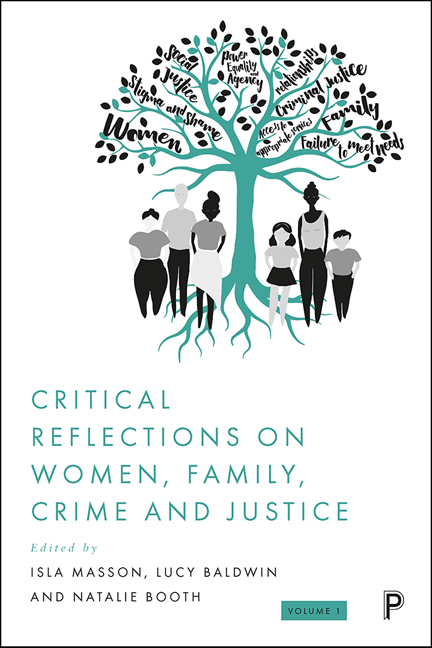Book contents
- Frontmatter
- Contents
- List of figures
- Notes on the contributors
- Acknowledgements
- Foreword: critical reflections from the Women, Family, Crime and Justice network
- 1 Starting the conversation: an introduction to the Women, Family, Crime and Justice network
- 2 Playing the game: women and community punishment
- 3 Harmful social and cultural practices that exist within South Asian communities in the UK and their impact on women
- 4 Exploring shame, love and healing within women’s recovery: an analysis of a trauma-specific intervention
- 5 Reducing the enduring harm of short terms of imprisonment
- 6 ‘Without it you’re lost’: examining the role and challenges of family engagement services in prisons
- 7 What are the challenges and opportunities for schools in supporting children of people in prison?
- 8 Impact and engagement work in the context of families of people in prison
- 9 Presence, voice and reflexivity in feminist and creative research: a personal and professional reflection
- 10 Service users being used: thoughts to the research community
- 11 Continuing the conversation: reflections from the Women, Family, Crime and Justice network
- Index
Foreword: critical reflections from the Women, Family, Crime and Justice network
Published online by Cambridge University Press: 21 December 2021
- Frontmatter
- Contents
- List of figures
- Notes on the contributors
- Acknowledgements
- Foreword: critical reflections from the Women, Family, Crime and Justice network
- 1 Starting the conversation: an introduction to the Women, Family, Crime and Justice network
- 2 Playing the game: women and community punishment
- 3 Harmful social and cultural practices that exist within South Asian communities in the UK and their impact on women
- 4 Exploring shame, love and healing within women’s recovery: an analysis of a trauma-specific intervention
- 5 Reducing the enduring harm of short terms of imprisonment
- 6 ‘Without it you’re lost’: examining the role and challenges of family engagement services in prisons
- 7 What are the challenges and opportunities for schools in supporting children of people in prison?
- 8 Impact and engagement work in the context of families of people in prison
- 9 Presence, voice and reflexivity in feminist and creative research: a personal and professional reflection
- 10 Service users being used: thoughts to the research community
- 11 Continuing the conversation: reflections from the Women, Family, Crime and Justice network
- Index
Summary
I was privileged to participate in the inaugural conference that launched the Women, Family, Crime, and Justice network. It was a dynamic and diverse gathering, determined not only to share knowledge and insights in an inclusive way, but also to provide opportunities for crossfertilisation between research, personal experience, policy and practice.
Mainstream discussions of crime and punishment rarely distinguish between women and men. This renders women invisible, marginalised as a small minority within a heavily male-dominated justice system. It has taken a long time for the criminal justice system in particular to understand that relationships are a significant ‘criminogenic risk factor’ for women, because they are such a strong protective factor for men. When men are sent to prison, women keep the home fires burning, visit them in prison, care for their children and provide essential support. The reverse is not true. Meanwhile, women with criminal convictions are regarded as doubly deviant – not only have they broken the law, but they have also offended against feminine stereotypes, especially if they are mothers.
This is an important book, contributing to an important project – a growing body of literature by, for and about women whose circumstances and constrained choices have conspired to make them ‘a female offender’. I especially welcome the thematic focus on stigma and shame, as that is an under-researched dimension of the gendered impacts of punishment, one that needs greater recognition.
Despite growing political consensus about the futility of shortterm imprisonment, it remains the case that nearly three quarters of women sentenced to prison are given sentences of less than 12 months, overwhelmingly for non-violent offences. The disregard for children when a mother is imprisoned (despite government claims that children's best interests are at the heart of all decision making) is matched by institutional disregard for the impacts on women themselves of forcible separation from their children.
The UK has one of the highest rates of women's imprisonment in Western Europe. It is well evidenced that high rates of imprisonment are closely associated with high levels of inequality, and it is salutary to note that in 2019 the UK fell six places in the global rankings of gender inequality, from an ignoble 15th place to 21st place (Global Gender Gap Report, 2020).
- Type
- Chapter
- Information
- Critical Reflections on Women, Family, Crime and Justice , pp. xi - xiiPublisher: Bristol University PressPrint publication year: 2021



